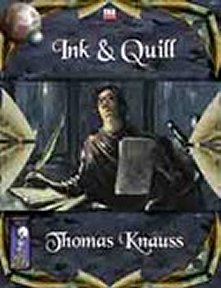
The introduction speaks of the importance of the written word to any civilisation, be it glyphs inscribed on rock, 'chicken-scratchings' on a clay tablet, an illuminated manuscript or something from a printing press. Writers fulfil all manner of roles: reporting events, entertainment, information, laying out laws and codes of conduct, explaining your deity's message... yet in the real world the idea that everyone needs to be able to read and write comes quite late on in the development of civilisation. It's not the case in your Dungeons & Dragons world. Unless you are a barbarian, it's assumed that you can read and write. This book seeks to exploit this quirk of the game, with a wealth of new feats, prestige classes, and ideas for how you can make the written word as significant as sword and spell in your game.
Chapter 2: The Writer's World talks about how those who earn their keep by the pen associate. Some meet for business purposes, others are more social. Some are professional: temples, universities and law courts for example. One thing to watch out for is censorship of ideas. It's not just governments or religions (although they tend to be more overt), say the 'wrong' thing in an academic meeting and you'll be laughed out of the hall, if not out of your position. Theatres provide an outlet for playwrights and so on. These and many more like ideas are discussed, including views on literacy. Is it really common? Or are adventures amongst the elite who have learned to read and write? One thing that's rather glossed over: it's not clear if the base assumptions include the invention of the printing press, or are all written materials painstakingly monk-xeroxed? There are notes on the sort of people attracted to the written word and why, and the sort of income (if any) that they can enjoy.
Next, Chapter 3: Feats and Skills translate a lot of these ideas into game mechanics. New feats - aimed predominately at the prestige classes in this book, but available to anyone interested who meets the prerequisites - are presented a-plenty. They are quite wide-ranging, and there are a few of interest to more warlike bards: firing arrows using a stringed instrucment instead of a bow or using a musical instrument as a weapon for example. There are no new skills, but the scope of the Knowledge skill is expanded greatly.
Then Chapter 4: Prestige Classes presents several writing-based ones. They may be best suited to NPCs or retired adventures, though - but could provide a source of income when it's the close season for adventuring. Barrister, Playwrite, Poet and the like are to be found here; along with Composers of music, scribes, and scholars.
Next we take a look at Chapter 5: Spellbooks and Spells. Spellbooks often demonstrate their place as prized possessions in the way they are decorated, but here some alternative forms are discussed. It all then gets quite complex - and costly! - as different writing materials and specialist inks are discussed. Or you can write your spell 'scrolls' in cuniform on a clay tablet if you prefer. Designer spell book covers and scroll cases are also covered, along with an extensive range of inks and assorted pens - fancy an owlbear quill, rather than a common goose one? There's a look at ways to safeguard that precious spellbook, and then we get on to the spells themselves, most of which are aimed at protecting spellbooks!
Chapter 6: Manuals comes next. This looks at books with instructional content, with the game mechanical bonuses that repay time spent studying them if you succeed in appropriate checks. This is followed by a fascinating collection of Magical Books (Chapter 8) which confer bonuses automatically. If making golems is your thing, a selection of Librams is provided as well.
Finally, Chapter 9: Artefacts presents some volumes that offer great power at great cost. Tread warily...
If you like books and the written word, there's plenty to amuse and maybe spawn ideas here. A quest for a specific tome, perhaps?
Return to Ink and Quill page.
Reviewed: 8 November 2019

